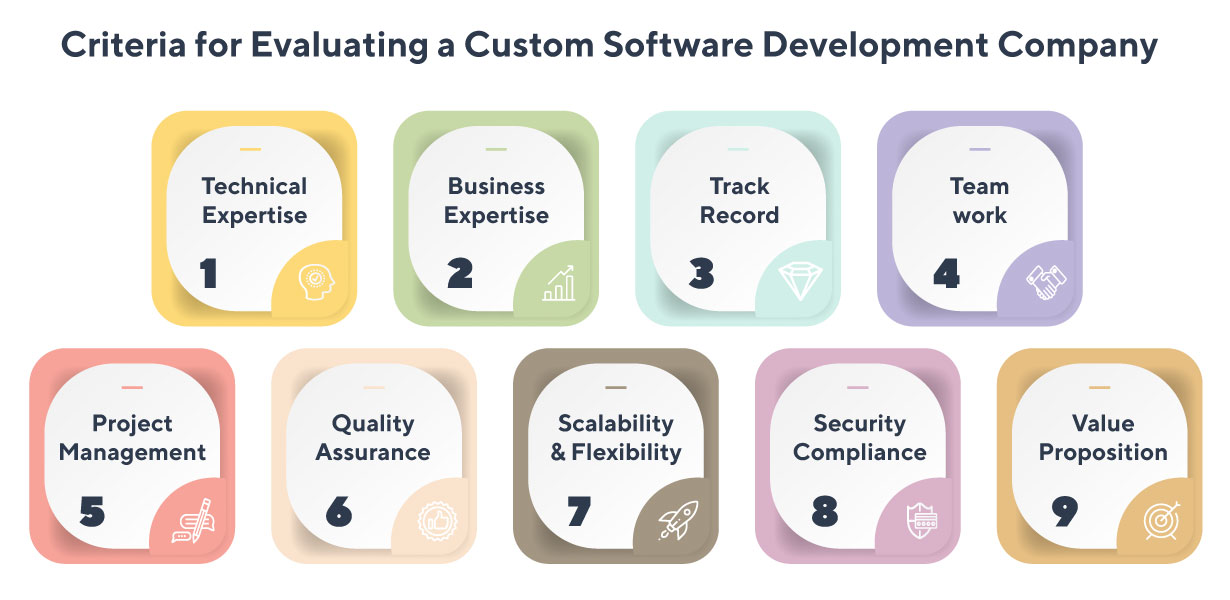Custom software development is crucial to organizational success in the current digital ecosystem. Due to the increasing need for cutting-edge and dependable software, CTOs seek innovative ways to boost their competitive advantages. But how exactly does custom software development achieve this, and why is it crucial for modern businesses?
This article will delve into the primary advantages and the crucial significance of investing in custom software development. We'll dissect the key advantages of investing in any organization looking to stay ahead in today's fast-paced technological landscape.
Building the Case for Custom Software Development Services
CTOs often wonder how to justify the selection of a custom software development partner. There's a plethora of vendors who can meet your unique requirements with off-the-shelf solutions. Yet, there are particular circumstances where bespoke software is better. We list several scenarios where CTOs should think about leveraging custom software.
Unique Needs
Standard software solutions don't always meet the unique needs of a company. Custom solutions cater to unique processes, requirements, and workflows. Let's say a hospital needs particular capabilities not found in commercially accessible software to manage patient data and electronic health records that adhere to tight regulatory standards. The company can satisfy these particular requirements by creating custom software.
Scalability
Scalability in off-the-shelf software is almost always restricted. As your company undergoes evolution, it may require technological solutions that can adjust to dynamic requirements. For instance, as an expanding e-commerce enterprise scales up, it may require bespoke solutions to oversee inventory and order management. By developing custom solutions with an emphasis on scalability, the company may continue using the solution even as the company grows and with no need to migrate to a new system. This approach is highly beneficial for growing companies that grow partially through acquisitions, for example. Keep in mind that only top software engineering companies will ask the right questions to provide highly configurable bespoke solutions that anticipate the complexity of multiple divisions, some originating organically and others joining by purchase.
Software Integration
Finding compatible off-the-shelf solutions that seamlessly work with existing software tools can be challenging. Tailored software solutions can be created to integrate seamlessly with your existing systems, optimizing workflow and augmenting productivity. Custom software can optimize business processes and give a competitive edge. For seamless integration, CTOs should choose firms skilled in software development and cloud migration/modernization. These companies can ensure the software is scalable, cloud-friendly, and adaptable to future needs. CTOs should look for partners offering public, private, and hybrid cloud migration solutions for deploying customized software on a suitable cloud environment. An accounting enterprise may require bespoke software that seamlessly connects with its existing client management and accounting systems. Thus, organizations can enhance operational efficiency and mitigate the potential for errors that may arise from using disparate software solutions.
Competitive Advantages
In the current dynamic business landscape, possessing a competitive advantage is imperative. Tailored software solutions can provide your organization with a competitive edge by offering a bespoke solution that is tailor-made to your unique business requirements. These competitive advantages can be gained by how companies organize, manage, govern, and exploit data assets directly into data pipelines for analytics, AI/ML, automation, and dashboards. For instance, an e-commerce enterprise may require bespoke software that delivers a distinctive client experience, such as a tailored shopping encounter or a mobile application that integrates with its rewards program. With custom software development services, retailers can establish a unique market position, enhance customer appeal, and foster customer loyalty.
Custom Software Development Process
Customized software development varies depending on the project's specific needs, but generally, it involves the following steps.
1. Requirements Gathering
To start a software development project, the team must first gather requirements by working closely with stakeholders to understand their needs. This involves identifying the problem statement, defining the project scope, and determining the necessary features. It helps the team to know the intended business benefits as opportunities are created and issues and pain points are reduced or resolved.
2. Project Plan Creation
Once the requirements are finalized, teams can move to create a robust project plan that includes timelines, budget, resource allocation, project milestones, and more. The project plan offers the planning team opportunities to embed best practices and risk mitigations tied to custom software.
3. Design & Architecture
Next, the team can begin designing and architecting the solution. Here, wireframes, mockups, and prototypes are created to help visualize the final product. Close interactions will be required with business stakeholders and their proxies the UI/UX Designers to ensure focus on end users.
4. Software Development
Once the design is complete, the development phase begins, with the software coding being executed according to the design specifications. This is often the most time-intensive phase of the software development lifecycle. Care must be taken to validate the design against the business and technical use cases and ensure buffer time is allocated for reasonable iterative refinements.
5. Quality Assurance
Quality assurance is critical in ensuring the software meets specifications and functions as intended. Comprehensive testing is conducted, including functional (end-user), performance, and security testing. The software is deployed to the production environment after successfully completing testing. This involves data migration, server setup, and software configuration for optimal operation.
6. Maintenance & Support
Finally, regular maintenance is required to ensure the software's ongoing performance and functionality. This includes resolving bugs, enhancing the software, and creating new functionality.
Keeping strong communication and close collaboration between the development team and stakeholders is key to ensuring the project is on track and meets the intended outputs. Additionally, it’s important to note that the custom software development processes are considered a subset of the Software Development Lifecycle (SDLC) which, of its own merit, includes a number of phases or steps that must be completed in sequential order to obtain a high-quality software product. Also, develop a software deployment and release strategy to progressively implement functionalities and shift end users to the new system using a thoughtful and supportive approach.
As we say: Good software that is of high quality and is properly implemented can be more successful for the users than great software of only average quality that lacks suitable implementation steps. We recommend you check out these helpful SDLC-related blogs for more details on stages in the Software Development Life Cycle and SDLC Methodologies.
Top 9 Criteria for Evaluating a Custom Software Development Company
When it comes to evaluating a custom software company, there are several key criteria that you should consider before making your decision.

1. Technical Expertise
The level of technical proficiency possessed by a custom software development firm is of utmost importance, as it has a direct impact on the caliber and efficacy of the software. High-quality bespoke software solutions are developed by a team of seasoned developers who possess expertise in diverse programming languages and technologies, which are pertinent to a wide range of multi-tech stack projects. Search for a bespoke software development firm that possesses expertise in the programming languages, frameworks, and technologies pertinent to your project.
For example, if you need a web application developed, look for a custom software development agency with experience in HTML, CSS, JavaScript, and server-side technologies like Node.js or Ruby on Rails.
2. Business Expertise
It is very important that the company you choose knows a lot about your business, your market, and the problems you face. Experience in many vertical industries is especially important because it lets the company offer unique views and insights on how to optimize your business processes, improve productivity and efficiency, and drive innovation.
If the software development company you partner with has worked in more than one vertical industry, it can bring in a wide range of information, skills, and points of view. This cross-industry knowledge lets the company make software solutions that meet your business's specific needs by using best practices and new ideas from other industries. Also, a software development business with experience in different industries can predict potential problems and offer a more complete way to solve them, making sure that your custom software development project will be a success.
Imagine a company that has done software projects for clients in the healthcare, finance, and retail fields. Because this company has experience in many different industries, it can offer its clients unique views and insights on how to improve their business processes.
For example, if the company is working on a software project for a healthcare provider, it can use its experience in the finance and retail industries to offer advice on how to improve the billing and payment processes for patients and how to improve the patient experience through personalized and convenient interactions. Also, if the company is working on a project for a client in the finance industry, it can use its experience in the healthcare industry to give advice on how to improve security and make sure that laws like HIPAA and PCI DSS are being followed.
Because the software development company has worked in more than one vertical industry, it can predict future problems, offer a more complete way to solve them, and create custom software solutions that meet the business needs of each client. This cross-industry knowledge gives the company the ability to offer new ideas and best practices from other industries, which helps clients gain a competitive edge in their own markets.
3. Portfolio and Track Record
The portfolio and track record of a custom software development enterprise can provide valuable insights into their competencies and expertise. Track record can be looked at in the form of business results and awarding of client testimonials and references. It is recommended to seek out a custom software development consultant with a robust portfolio of successful projects that align with your specific requirements. For example, if you need a mobile app developed, look for a custom software company that has experience building mobile apps for iOS and Android and has a portfolio of successful mobile app projects.
4. Communication, Coordination, and Collaboration
Effective communication and collaboration are imperative for the successful implementation of custom software solutions. Coordination can include various direct project participants on the custom software development team’s provider and the client team plus part-time client stakeholders and other 3rd parties. Seek out a bespoke software development firm that boasts transparent communication channels, exhibits swift responsiveness to inquiries, and adopts a collaborative methodology when partnering with clients.
5. Project Management and Methodologies
The efficacy of a project's outcome can be heavily influenced by the project management and methodologies employed by a custom software development enterprise. It is recommended to seek out an organization that implements established project management methodologies, such as Agile or Scrum, and has a history of effectively overseeing analogous projects. Look for a company that has a well-defined project management process, assigns clear roles and responsibilities, and provides regular progress reports.
6. Quality Assurance and Testing
Quality assurance and testing are critical for ensuring that the software meets the required specifications and works as expected. Often, retrospective and continuous improvements are influenced by the QA team and are then engaged and facilitated by the Project Managers, Service Delivery Managers, and the client. Look for a company that conducts regular testing throughout the development process, has a team of dedicated QA engineers, and uses automated testing tools.
7. Scalability and Flexibility
A custom software development project should be designed to accommodate future growth and changes. Look for a company that has experience building scalable and flexible software solutions. Look for a company that designs software with future growth in mind, uses a modular architecture, and can adapt to changing requirements.
8. Security and Compliance
Ensuring security and compliance are crucial factors to be taken into account for every software project. Search for a firm that possesses expertise in constructing secure and compliant software solutions and has a comprehensive comprehension of pertinent regulations and standards. Look for a company that implements security best practices, conducts regular security audits, and has experience with compliance frameworks like HIPAA or GDPR.
9. Pricing and Value Proposition
Pricing is an important consideration for any custom software development project. Look for a company that offers transparent pricing and has a pricing model that aligns with your budget and project requirements.
Choosing the right partner is key to the success of your custom software project. A good partner for growth should be open, responsible, and flexible, with a strong focus on high standards and best practices. You should look for a partner who talks to you in an open and honest way, gives you regular updates and reports on how things are going, and is honest about any problems or problems that come up.
Another important thing to think about when choosing a growth partner is accountability. Look for a partner who takes responsibility for their work, meets goals, and does what they say they will do. It's also important to think about flexibility. You should look for a partner who is adaptable and can change with the needs or goals of the project. It is very important to choose a development partner who follows best practices and high standards like agile methods, code review, and testing.
Lastly, also look for a partner that provides a detailed cost breakdown, offers flexible pricing options, and can provide accurate cost estimates based on your project requirements.
When assessing a custom software development firm, it's crucial to take into account their technical proficiency, portfolio and history, communication and teamwork, project management and methodologies, quality assurance and testing, scalability and adaptability, security and compliance, and pricing. By taking into account these criteria, you can make a well-informed decision and select a company that is most suitable for your project's requirements.
Why Choose Svitla Systems As Your Custom Software Solutions Provider?
Svitla Systems is the premier custom software development provider that you can trust for all of your software needs. With over 20 years of experience in the industry, Svitla Systems has established itself as a leader in custom software development, consistently delivering innovative and top-quality solutions that exceed client expectations.
Svitla Scorecard | |
|
Criteria |
How Svitla Addresses Each One |
|
Technical Expertise |
The company's team of experienced and highly skilled engineers is dedicated to delivering the best solutions possible, leveraging the latest technologies and methodologies to ensure clients are satisfied with the end result. |
|
Business Expertise |
As a company with a 20-year background, Svitla Systems has experience in many different industries like finance, healthcare, hospitality, e-commerce, logistics, education, and more. As such, we are poised to offer clients unique views and insights on how to improve business processes. |
|
Portfolio and Track Record |
What sets Svitla Systems apart from the competition is its proven track record of working with big-name clients across various industries, delivering solutions that meet their unique needs and challenges. Svitla Systems’ portfolio showcases its expertise in a wide range of areas, from healthcare and finance to e-commerce and education. |
|
Communication, Coordination, and Collaboration |
Being experts in distributed teams across the globe, Svitla Systems has robust communication protocols to ensure seamless collaboration amongst all team members and the client. |
|
Project Management and Methodologies |
Svitla Systems has a highly-skilled team of Project Managers who specialize in next-gen technologies and approaches. They are all adept in Agile methodologies, embedding each project with best-in-class delivery. |
|
Quality Assurance and Testing |
Quality is one of Svitla’s cornerstones. Its expanding team of highly-skilled QA engineers helps deliver automation, speed, and quality to each client project. |
|
Scalability and Flexibility |
Svitla Systems grows with you. Whether you are a startup company or a Fortune 500 enterprise, Svitla has the capabilities and resources to meet your unique needs. |
|
Pricing and Value Proposition |
Svitla Systems’ proven engagement models are designed to meet your unique project requirements to ensure competitive pricing and deliver value. |
Svitla Systems is more than just a software development company; it is a true partner for its clients. Svitla Systems values clear communication, collaboration, and transparency throughout the development process, working closely with clients to ensure that their needs and expectations are met every step of the way.
We recommend that you take a peek at some of the latest client testimonials and case studies that showcase our unwavering commitment to placing our clients' requirements and goals at the forefront of our endeavors.
Choosing the right custom software development company is crucial for the success of any software project. By evaluating the key criteria discussed in this article, including technical expertise, portfolio and track record, communication and collaboration, project management and methodologies, quality assurance and testing, scalability and flexibility, security and compliance, and pricing, you can make an informed decision and choose a company that is best suited to your project's needs.
Care to learn more? Reach out to our experts who will be happy to provide all the information you need.





